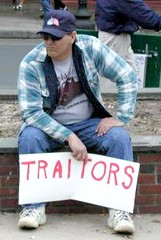A Matter of Opinion

A lot of fuss is being made of President Bush's purported plans to move chess pieces in Iran. Supposedly, the President has been biding his time, waiting for the election to be consummated by his second inauguration, and then he's off to dispatch the Mullah's isotopes. Indeed, his war map seems ever expansive.
Nearly as much ado has been made of Seymour Hersh's article on the subject of the Bush administration's strategy for Iran, The Coming Wars. Hersh has a long record of investigative journalism that exposes the unsavory nadir of American policy abroad. Of course, there's been plenty of worms and vipers to be found, all quite alarming. He is adept at his craft---he covered the Mai Lai massacre story in 1969, earning him a Pulitzer. More recently, he added his weight to expose the Abu Ghraib prisoner abuse case in Iraq. So Mr. Hersh's report on American plans to subvert Iran's nuclear program should come as no surprise. The release of his article in The New Yorker, some argue, borders on treason since it flutters closely to violating the Espionage Act.
The Espionage Act outlaws anyone in a time of war from conveying false reports with intent to interfere with a military operation, or in any way promoting the success of the enemy. Hersh's supporters say that he only was being a good investigative journalist, and that the facts are unsavory but true---and that a free society should know its government's bidding. His detractors argue that he is aiding and abetting the enemy by revealing our military's offensive strategy---an ememy that is on the threshold of becoming a nuclear power, with the will to wield such power in ways that will change our lives forever.
Watching the Hersh Ping-Pong ball go back and fourth highlights an essential divide within the West, and within America. People either believe we are at war with an enemy who wants to dismantle our secular, liberal and democratic system---or they don't. It seems that mere individual predisposition points the weather vane towards war or to a new wrinkle in the status quo. Each side has a mountain of facts and opinions to back up its view.
People who gloss over that we're at war downplay the intent of the Jihadists, and their unique grip on the West's underbelly. If they spent more time absorbing Islamic agitprop, took a look at European demographics, and fascinated themselves with the full breadth of Western rot that is exploited by eager volunteers ready to die, a bleak picture emerges---one that is not unlike Nazis gallivanting in the streets of Berlin in the 1930s. Or perhaps German tribesmen baring down on Adrianople in 378. There are many signs---indeed, actions on the Jihadist's part----that point to a cogent enemy strategizing to bring down the West in an era of individual empowerment.
People who insist that we're at war often gloss over the post-modern qualities of the current conflict, seeing it analogously to past wars. Yet this war defies maps, armies, and battle lines. Nihilism bares no flag; and it is well-served by the technology of this age, which enables insidiousness on a grand scale alongside the blessings it bestows. Gone are the days of the panopticon mass media---useful for rallying the troops and targeting the ire of the masses towards a common foe. Asymmetrical warfare is the child of cheap, clever technology. This war will remain undeclared, and highly evolutionary. This is not your father's war, and no amount of flag-waving or Bush-worshipping will change that. A war that defies maps and battle lines--and even a declaration---also defies suasive rhetoric to mobilize a unified nation.
There are many indications that in the world of media alone, the future promises as many channels as there are possible broadcasters. Text and photo blogging are scratches on the surface of the coming mediasphere that leverages broadband, high quality and low cost production tools, and persuasive voices that have something to say. As we enter the trillion channel universe, war and status quo will be wrestling in a glue of nuanced opinion, where consensus never arrives. Take away the Internet, television, cell phones and the tabloid press---and we could have Roosevelt again, chatting to us at the fireside.
This blogger believes we are in a war---very reluctantly so, and hopeful that it can be won. But he is not deluded. As much as Victor Davis Hanson writes beautifully eloquent essays on the historicity of this conflict, and America's central role in safeguarding the world's freedom, the precedent for our crisis is scant, and grows wanting as we advance ever further into a novel world of unknowns brought about by proliferating technological prowess that is outside of anyone's control. Seymour Hersh is right that we are setting ourselves up for becoming a society of secret warriors, obsessively bent on the destruction of our enemies. And that it is ugly, cruel and unfortunate---besmirching many of the values our free society holds close. The alternative to confronting Medieval men with nukes seems as elusive to Mr. Hersh as whether or not he believes we're in a real, justified war. It is, for now at least, a matter of opinion.

<< Home